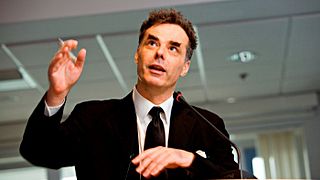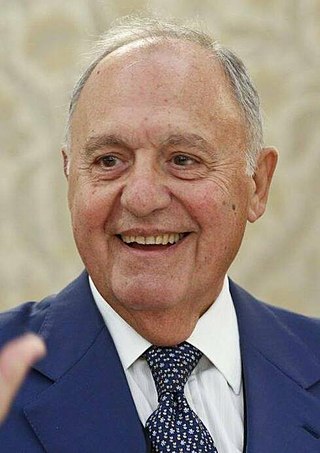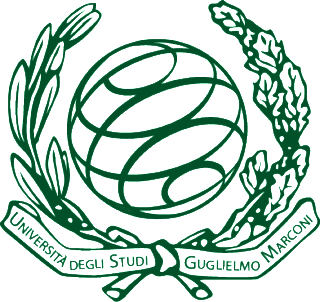Capitalism is an economic system based on the private ownership of the means of production and their operation for profit. Central characteristics of capitalism include capital accumulation, competitive markets, price systems, private property, property rights recognition, economic freedom, profit motive, commodification, voluntary exchange, wage labor and the production of commodities. In a market economy, decision-making and investments are determined by owners of wealth, property, or ability to maneuver capital or production ability in capital and financial markets—whereas prices and the distribution of goods and services are mainly determined by competition in goods and services markets.

The End of History and the Last Man is a 1992 book of political philosophy by American political scientist Francis Fukuyama which argues that with the ascendancy of Western liberal democracy—which occurred after the Cold War (1945–1991) and the dissolution of the Soviet Union (1991)—humanity has reached "not just ... the passing of a particular period of post-war history, but the end of history as such: That is, the end-point of mankind's ideological evolution and the universalization of Western liberal democracy as the final form of human government."

Christian democracy is a political ideology inspired by Christian social teaching to respond to the challenges of contemporary society and politics.
Dependency theory is the idea that resources flow from a "periphery" of poor and exploited states to a "core" of wealthy states, enriching the latter at the expense of the former. A central contention of dependency theory is that poor states are impoverished and rich ones enriched by the way poor states are integrated into the "world system". This theory was officially developed in the late 1960s following World War II, as scholars searched for the root issue in the lack of development in Latin America.
Modernization theory holds that as societies become more economically modernized, wealthier and more educated, their political institutions become increasingly liberal democratic. The "classical" theories of modernization of the 1950s and 1960s, most influentially articulated by Seymour Lipset, drew on sociological analyses of Karl Marx, Emile Durkheim, Max Weber, and Talcott Parsons. Modernization theory was a dominant paradigm in the social sciences in the 1950s and 1960s, and saw a resurgence after 1991, when Francis Fukuyama wrote about the end of the Cold War as confirmation on modernization theory.
A theory of capitalism describes the essential features of capitalism and how it functions. The history of various such theories is the subject of this article.
Post-capitalism is in part a hypothetical state in which the economic systems of the world can no longer be described as forms of capitalism. Various individuals and political ideologies have speculated on what would define such a world. According to classical Marxist and social evolutionary theories, post-capitalist societies may come about as a result of spontaneous evolution as capitalism becomes obsolete. Others propose models to intentionally replace capitalism, most notably socialism, communism, anarchism, nationalism and degrowth.
Capitalism is an economic system based on the private ownership of the means of production, and their operation for profit. Other characteristics include free trade, capital accumulation, voluntary exchange, wage labor, etc. Its emergence, evolution, and spread are the subjects of extensive research and debate. Debates sometimes focus on how to bring substantive historical data to bear on key questions. Key parameters of debate include: the extent to which capitalism is natural, versus the extent to which it arises from specific historical circumstances; whether its origins lie in towns and trade or in rural property relations; the role of class conflict; the role of the state; the extent to which capitalism is a distinctively European innovation; its relationship with European imperialism; whether technological change is a driver or merely a secondary byproduct of capitalism; and whether or not it is the most beneficial way to organize human societies.

Criticism of capitalism is a critique of political economy that involves the rejection of, or dissatisfaction with the economic system of capitalism and its outcomes. Criticisms typically range from expressing disagreement with particular aspects or outcomes of capitalism to rejecting the principles of the capitalist system in its entirety.
The Beijing Consensus or China Model, also known as the Chinese Economic Model, is the political and economic policies of the People's Republic of China (PRC) that began to be instituted by Deng Xiaoping after Mao Zedong's death in 1976. The policies are thought to have contributed to China's "economic miracle" and eightfold growth in gross national product over two decades. In 2004, the phrase "Beijing Consensus" was coined by Joshua Cooper Ramo to frame China's economic development model as an alternative—especially for developing countries—to the Washington Consensus of market-friendly policies promoted by the IMF, World Bank, and U.S. Treasury. In 2016, Ramo explained that the Beijing Consensus shows not that "every nation will follow China’s development model, but that it legitimizes the notion of particularity as opposed to the universality of a Washington model".

Daniele Archibugi is an Italian economic and political theorist. He works on the economics and policy of innovation and technological change, on the political theory of international relations and on political and technological globalisation.

The post–World War II economic expansion, also known as the postwar economic boom or the Golden Age of Capitalism, was a broad period of worldwide economic expansion beginning with the aftermath of World War II and ending with the 1973–1975 recession. The United States, the Soviet Union and Western European and East Asian countries in particular experienced unusually high and sustained growth, together with full employment.

Franco Archibugi was an Italian scholar in political, economic and social sciences, university professor in economic policy and spatial planning. He largely operated in Italy and in international governmental agencies; including in the field of economic development, social welfare and cooperation policy. Archibugi was the author of several works in planning theory and methodology, and was among the theorists and promoters of a new unitary discipline of planning – the “Planology” – aimed at creating a bridge between the theoretical scientific progress in economics and other social sciences with the actual political and administrative efficiency and management. After retiring from academia, he was still an active researcher as President of the Planning Studies Centre. He died in Rome in November 2020 at the age of 94.

Paolo Savona is an Italian economist, professor, and politician. He was the Italian Minister of European Affairs from 1 June 2018 until 8 March 2019, his second stint in government after 1993–1994. During the 2010s, Savona became one of the most fervent Eurosceptic economists in Italy.
Economic democracy is a socioeconomic philosophy that proposes to shift ownership and decision-making power from corporate shareholders and corporate managers to a larger group of public stakeholders that includes workers, consumers, suppliers, communities and the broader public. No single definition or approach encompasses economic democracy, but most proponents claim that modern property relations externalize costs, subordinate the general well-being to private profit and deny the polity a democratic voice in economic policy decisions. In addition to these moral concerns, economic democracy makes practical claims, such as that it can compensate for capitalism's inherent effective demand gap.

Guglielmo Marconi University (GMU), often abbreviated as UniMarconi is a private, non-profit university in Rome, Italy. The university offers degrees at the undergraduate and graduate level.

Imperialism, the Highest Stage of Capitalism, originally published as Imperialism, the Newest Stage of Capitalism, is a book written by Vladimir Lenin in 1916 and published in 1917. It describes the formation of oligopoly, by the interlacing of bank and industrial capital, in order to create a financial oligarchy, and explains the function of financial capital in generating profits from the exploitation colonialism inherent to imperialism, as the final stage of capitalism. The essay synthesises Lenin's developments of Karl Marx's theories of political economy in Das Kapital (1867).
Ethical socialism is a political philosophy that appeals to socialism on ethical and moral grounds as opposed to consumeristic, economic, and egoistic grounds. It emphasizes the need for a morally conscious economy based upon the principles of altruism, cooperation, and social justice while opposing possessive individualism.

The Ordine Nero was an Italian terrorist fascist group founded in 1974 following the dissolution of the fascist Ordine Nuovo. Between 1974 and 1978, bombings by ON led to a number of woundings and deaths, having orchestrated several deadly bombings and murders including the 1974 Italicus Express Bombing and the 1974 Brescia Bombing.
Authoritarian capitalism, or illiberal capitalism, is an economic system in which a capitalist market economy exists alongside an authoritarian government. Related to and overlapping with state capitalism, a system in which the state undertakes commercial activity, authoritarian capitalism combines private property and the functioning of market forces with repression of dissent, restrictions on freedom of speech and either a lack of elections or an electoral system with a single dominant political party.










